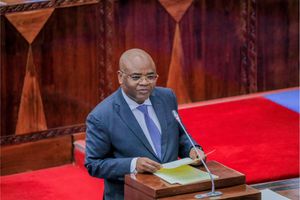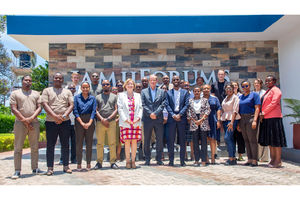Samia set to table four key issues at the World Economic Forum

The President's attendance means that Tanzania could effectively utilize the gathering to find global responses to issues affecting the country and world at large. PHOTO | COURTESY
What you need to know:
- Analysts say the President's attendance means that Tanzania could effectively utilize the gathering to find global responses to issues affecting the country and world at large as it takes place against the backdrop of a volatile global economy
Dar es Salaam. Tanzania is taking four key issues to the World Economic Forum (WEF) in Davos-Klosters, Switzerland where President Samia Suluhu Hassan is in attendance.
The Director of Presidential Communications, Zuhura Yunus, told The Citizen yesterday that apart from attending a workshop on Food Action Alliance: Investing on Greater Resilience, the country will also present its views on how to restart global cooperation, Tanzania’s strategy dialogue as well as attend a plenary session on powering the world.
The five-day event, which started yesterday, takes place against a backdrop of a volatile global economy.
Analysts say the President’s attendance means that Tanzania could effectively utilize the gathering to find global responses to issues affecting the country and world at large. A lecturer at the University of Dar es Salaam, Prof Humphrey Moshi, said that being part of the world, Tanzania faces global challenges such as climate change, inflation and the impacts of the war in Ukraine.
“Since the meeting brings together leaders and economists, it is the right platform to collectively review economic policies in order to cope with the prevailing situations, especially inflation,” he said.
In line with the issue pertaining to food action alliance, Prof Moshi said that Tanzania could see how best its agriculture can assure food security for the country.
He said that with US inflation rising to a 40-year record-high, it was also vital that the leaders discuss the best way out of the situation. This was in the view that high inflation in the US sends the cost of borrowing for development financing high for developing countries like Tanzania.
With the impacts of climate change being vividly witnessed, the forum also offers a chance for Tanzania and other developing countries to ask their developed counterparts to honor their pledges on funds to mitigate the impacts of climate change.
“We are talking of industrialised countries that lead in environmental pollution, including the US, China and India among others which have jointly pledged about Sh100 billion annually. They have not honored the pledge,” he said.
An expert in economic diplomacy, Kitojo Wetengere, from Centre for Foreign Relations (CFR) said that the forecast shows that 2023 will be tough. It is only meaningful for leaders to discuss solutions.
A report released at the forum yesterday noted that a majority of the World Economic Forum’s Community of Chief Economists expect a global recession in 2023, see geopolitical tensions continuing to shape the global economy, and anticipate further monetary tightening in the United States and Europe.
In the Chief Economists Outlook, which was launched yesterday at the WEF Annual Meeting in Davos-Klosters, Switzerland, almost two-thirds of chief economists believe a global recession is likely in 2023; of which 18 percent consider it extremely likely – more than twice as many as in the previous survey conducted in September 2022. A third of respondents consider a global recession to be unlikely this year.
An economist from the University of Dar es Salaam, Abel Kinyondo said the prevailing global economic situation offers Tanzania the chance to up its processing capacity by building adequate factories.
For his part, expert in economy and business Donath Olomi said that through this year’s agenda, the government will have good policies in many areas including innovation and technology.





